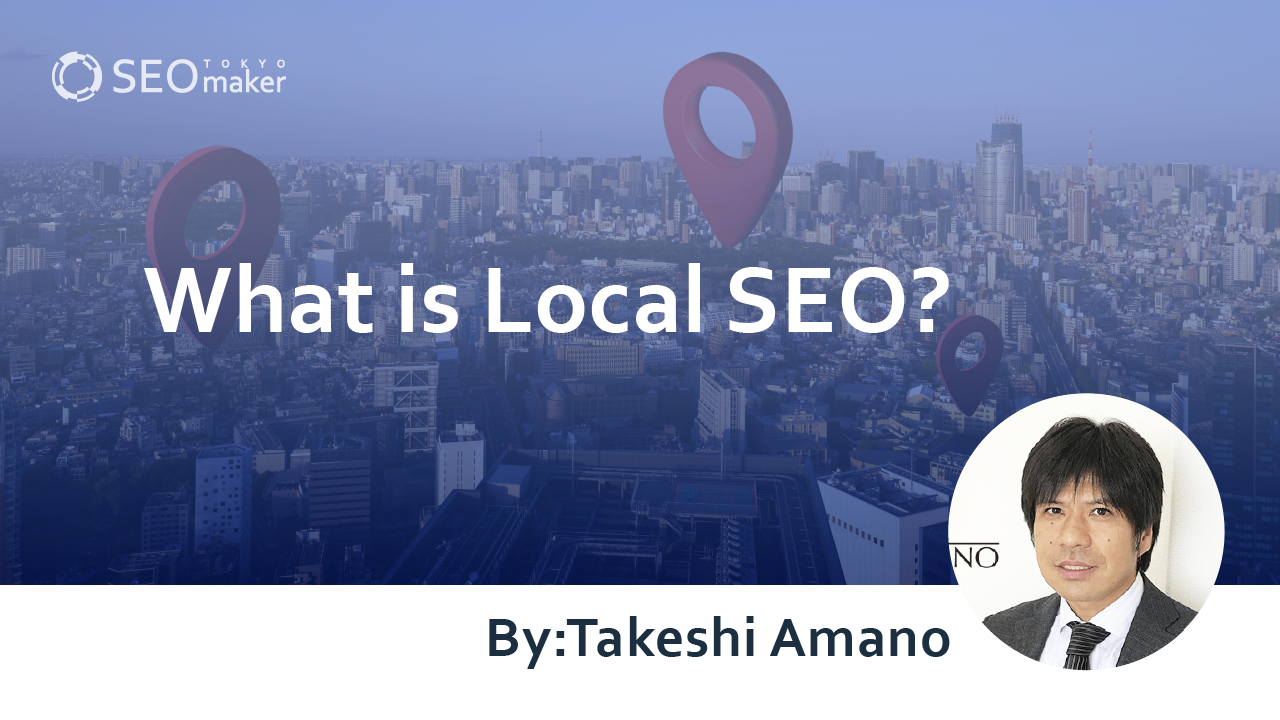What is Local SEO? Explaining When to Implement Local SEO Strategies
contents

Local SEO refers to search engine optimization strategies targeted at a specific geographic area. Specifically, it involves setting keywords that are highly relevant to a specific region, such as using “restaurant in [County Name]” to tailor content for regional searches.
In recent years, the use of mobile devices’ location services as a substitute for traditional maps has become commonplace. Websites need to communicate their location to users of these services. This is where local SEO strategies come into play.
This time, we will discuss Local SEO, which is part of overall SEO. We will explain the situations where Local SEO is necessary and its specific effects. Tokyo SEO Maker, a specialized SEO media outlet, clearly summarizes the measures that should be taken for Local SEO.
What is Local SEO?
As part of overall SEO efforts, local SEO focuses on enhancing your site’s visibility in search results and on Google Maps when searches include local keywords. Local SEO typically involves searching with the region name + keyword, as follows.
“Shibuya Ward, Ramen”
If well-executed, local SEO can directly enhance customer traffic, making it particularly beneficial for businesses like restaurants and hotels that heavily interact with local residents and tourists.
However, local SEO is not merely about listing business information to achieve higher rankings; it requires robust strategies to succeed.
Local SEO displays information from Google My Business, so enhancing this information is key to success. Providing accurate and up-to-date information that users are seeking is crucial for achieving higher search rankings.
The Need for Local SEO: Background and Implementation Cases
Since the widespread adoption of smartphones and tablets post-2010, there has been a significant increase in users searching for destinations on the go. Nowadays, instead of carrying a physical map, it’s commonplace to use mobile devices’ location services and maps.
To address these changes, Google introduced an algorithm update known as the “Venice Update,” which incorporates location data into search results. This adaptation has led web media to adopt local SEO as a key part of their traffic strategy.
What is SEO?
Essentially, SEO aims to elevate a website’s ranking in search engine results. Local SEO specifically targets search needs related to specific geographic areas, thus falling under the broader SEO umbrella.
Firstly, check out the link below to grasp the basics of SEO
>>What is SEO?
Cases for Implementing Local SEO
Local SEO is primarily needed for two purposes.
- Attracting customers to physical stores or facilities
- Communicating company information”
Attracting Customers to Physical Locations or Facilities
Local SEO is crucial for businesses with physical stores or service facilities to attract customers. Examples are as follows.
-
- Restaurants
- Department stores or supermarkets
- Hotels
- Hair and beauty salons
- Hospitals and clinics
Search users often look for local businesses and facilities, searching with keywords like “Ramen in [City Name]”. These searchers are potential customers for such businesses. Therefore, it’s essential to implement local SEO strategies to direct these potential customers to your website.
Communicating Corporate Information via Local SEO
To effectively communicate a company’s location externally, it’s advisable to implement local SEO strategies. For example, consider scenarios where a company’s location might be searched on a map.
- Job applicants heading to the company for an interview
- Business partners traveling to the company for negotiations
- External media visiting the company for interviews or meetings
In such cases, visitors often use Google Maps to navigate to the company’s location. This is especially convenient if your company frequently hosts meetings or negotiations.
Benefits of Local SEO
Local SEO offers the following four advantages.
- Less competition, easier to get started
- Direct impact on customer attraction
- Simpler and less costly compared to broader SEO efforts
- Affordable and easy to implement
Local SEO is generally easier to manage with less competition. Unlike broader SEO, it doesn’t require significant investment, making it an accessible strategy for many businesses. Local SEO not only offers various advantages but also tends to yield quicker results.
Ease of Entry with Less Competition
While SEO is highly competitive, local SEO often has less competition because it is limited to specific regions, reducing the number of competitors to those within the immediate area. This naturally leads to fewer competitors and easier market entry.
In broader SEO, achieving high rankings can be challenging despite the use of SEO tools and strategies, and results may not always reflect efforts promptly. However, local SEO faces fewer competitors and thus, results are more likely to be noticeable.
Effective in Attracting Customers
Many users who search using a combination of location and keywords have a specific intent to visit the area. This direct link makes local SEO particularly effective for driving foot traffic to facilities or stores. Features like addresses, reservation buttons, and call buttons make it easier for users to take action, enhancing the conversion potential.
Additionally, the increased visibility to many users also helps in boosting brand recognition.
Lower Difficulty Compared to General SEO
General SEO requires consideration of various factors, such as domain power, targeted keywords, and search volume, and often demands intricate planning. Furthermore, it’s challenging for individuals or small teams to compete against large companies with specialized personnel.
However, local SEO focuses solely on nearby competitors. The strategies involved are simpler compared to general SEO, making it less complex.
Cost-Effective and Easy to Start
Local SEO is straightforward, which keeps costs low. Since Google My Business, a primary tool for local SEO, is free, you can start with minimal expense.
This low-cost approach allows for high visibility in search results without significant investment, making it an accessible strategy for businesses. If successful, the return on investment can be substantial, making it a worthwhile endeavor.
Specific Effects of Local SEO
Including local keywords in searches triggers the display of specialized content like Google Maps and store information in the search results. This integration by Google enhances user convenience by reflecting location data and maps when local keywords are included.
For site operators, implementing local SEO secures a spot in these specialized content sections of the search results, such as the following.
- Organic search results
- Local Pack
- Knowledge Panel
- Google Maps search results
Organic Search Results
Organic search results refer to the ranking of pages displayed in response to a keyword-based search. This is the most crucial result from a general SEO perspective.
For instance, a search for “Tokyo SEO” will display pages of SEO companies located in Tokyo at the top of the search results.
Search users look for information on SEO companies located in Tokyo. They review the title and description in the search results and then choose a page to visit.
Placement in the Local Pack
The Local Pack appears when you search using keywords that include a location name, showing up on the search results page along with Google Maps. The entities shown here are those registered with Google Business Profiles.
For example, searching “Tokyo SEO company” might display a list of SEO companies along with maps, allowing users to check the list of companies in Tokyo. Additionally, if using location services, users can see how far they are from these companies on the map.
Placement of the Knowledge Panel
The Knowledge Panel is a special display area that appears when searching for a store name or company name. It shows information registered with Google Business Profiles, similar to the Local Pack.
For example, searching for “Tokyo SEO Maker” will display the registered information as shown below.
Users primarily search for information about Tokyo SEO Maker. This allows them to review the service overview directly from the search results page without navigating away.
Google Maps Search Results
Google Maps search results refer to the display that appears when a keyword search is performed on Google Maps. This display includes the location of relevant stores or companies, along with business information.
For instance, if you search for “Tokyo SEO Maker,” the map will display the location along with registered information as follows.
Users primarily use this to verify the location of the company operating Tokyo SEO Maker. It allows them to physically visit the company by identifying its location on the map.
Examples of Local Keywords
When implementing local SEO, compound keywords such as “region name store name (industry name)” are used. Let’s look into the two components more closely:
-Region Name
-Store Name or Industry Name
Region Name as a Keyword
Primarily, you should consider the following as keywords for the region name.
-Prefectures
-Cities, wards, or towns
-Stations or lines
Prefectures
Prefecture names are the foremost regional names to be used as keywords. However, bear in mind that prefectures are broad keywords with many competitors, making SEO success highly challenging.
Cities, Wards, and Towns
Cities, wards, and towns are elements contained within prefectures and generally present a lower difficulty level for SEO. These keywords offer specificity and are typically within the searcher’s living area, making it more likely for searches to directly lead to store visits or appointments compared to prefecture-level searches.
Stations and Rail Lines
When searchers use stations or rail lines as keywords, it often indicates they are looking within their living areas. Especially if a store is located near a station, using the station name or rail line as a keyword can perform very well.
Store and Industry Names as Keywords
Next, the targets for keyword setting in combination with regional names include the following.
- The industry or business type of the store or company
- The proprietary name of the store or company
Industry or Business Type
Set keywords based on the type or industry of the store, facility, or company. Possible types or industries include the following.
- Restaurants
- Convenience stores
- Hotels
- SEO companies
- Publishing houses
Combine these with regional names to set compound keywords like the following.
- Tokyo convenience store
- Shibuya family restaurant
- Shinjuku station hotel
Store or Company Names
Using proprietary names like store names as keywords increases specificity. However, unless the store or company has a certain level of recognition, it’s rare for them to be searched by proprietary names alone.
Typically, unless there are special circumstances, stores or companies are not searched by proprietary names alone without regional names. When considering compound keyword searches with regional names, this usually applies to national chains or major companies, such as the following.
- Shibuya McDonald’s
- Shinjuku Station Seven-Eleven
Steps to Implement Local SEO
- Register with Google Business Profile
- Set local keywords
- Maintain up-to-date information on the site
- Increase reviews and ratings
Register with Google Business Profile
Google Business Profile (formerly Google My Business) collects store and company information to display in search results.
By registering with Google Business Profile, when your store name or company name is searched on Google search engines or Google Maps, your business information will be displayed in the search results. This is very useful for search users checking map searches or reviews. Therefore, registering with Google Business Profile is essential for implementing local SEO.
Set Local Keywords
When advancing SEO measures, it is common to set keywords. However, in local SEO, it is essential to set local names as keywords. Create pages by combining these local names with the following types of keywords.
- The industry or type of store or company
- Words related to the industry or type
- Store name or company name
For example, if you run a Japanese restaurant, you could set up a website and use keywords like “City name + Japanese cuisine.” Furthermore, you would use related keywords such as the following.
- City name Japanese cuisine breakfast
- City name miso soup
- City name tempura
For setting keywords for store names or company names, please do as follows.
- Include them in each page’s title tag
- Markup with structured data
Structured data is a method of providing information about a website to search engines. Using structured data, for example, can make it clear to Google that “Company Name = XYZ Corporation.” For more information on structured data, refer to the following article.
>>What is Structured Data? Understanding the Benefits, Drawbacks, and How to Markup”
Maintain Up-to-Date Information
For corporate or store websites, it is crucial to provide accurate information. Incorrect details, especially regarding important aspects like service pricing, can lead to serious issues. Therefore, in cases such as the example below, it is necessary to promptly correct the information posted on the site.
- Service content and pricing updates
- Changes in business hours
- Relocation of the headquarters or store
These should be promptly updated on the website. Additionally, for local SEO, ensure that the information registered in Google Business Profile is also updated accordingly.
Increase Reviews and Ratings
Given that local SEO is closely tied to the region, reviews are highly impactful. Positive reviews are essential.
Google Business Profile displays user-generated reviews. For instance, a user might leave a comment like “excellent service” on the profile of a restaurant they visited. Accumulating such positive reviews can signal to Google that your business is popular, potentially improving your ranking in search results.
Here is an example from the reviews on Tokyo SEO Maker (this site). Reviews are posts from general service users and cannot be controlled by the service provider. While the sample shows mostly high ratings, be aware that accumulating low ratings can have the opposite effect.
Additionally, there may be cases where false information or prank reviews are posted. In such cases, please report the spam through Google Business Profile.
Common Questions about Local SEO
Q: What is the difference between MEO and Local SEO?
Answer) While MEO (Map Engine Optimization) and Local SEO involve similar strategies, their focus differs slightly.
Local SEO aims to optimize visibility in keyword search results and on Google Maps. MEO specifically targets ranking higher in Google Maps search results. Therefore, MEO is considered a subset of Local SEO.
For more details on MEO, refer to the following article
>>SEO vs. MEO: Which Should You Prioritize?
Q: What are the benefits of Local SEO?
Answer) Local SEO optimizes your visibility when searches include regional keywords.
Implementing Local SEO ensures that your business appears in the following when searched with regional keywords.
- Organic search results
- Local Pack
- Knowledge Panel
- Google Maps search results
Organic search results mean your website appears in the usual search rankings. When regional keywords are used, your business information also appears in specialized local search areas.
Q: How to perform Local SEO?
Answer) Local SEO involves specific strategies, such as registering with Google Business Profile.
Local SEO is a component of broader SEO practices. First, implement general SEO measures, then focus on the following.
- Registering with Google Business Profile
- Setting local keywords
- Managing reviews and ratings
- Updating business information regularly
For a comprehensive guide on general SEO strategies, refer to the following article
>>What is SEO? Complete Guide to SEO Strategies [Updated May 2023] – Simple Explanation of Basics and Techniques
Summary
Local SEO optimizes search result visibility for regional keywords. It ensures that your business appears in specialized search results like organic results, location information, and Google Maps. This visibility drives traffic to your physical location, making Local SEO essential for businesses with physical stores.










![What is a Description? Explaining the Meaning, Writing Style, and Changing Word Count – [2023 Edition]](https://www.switchitmaker2.com/en/wp-content/uploads/2024/09/what-is-description.webp)










